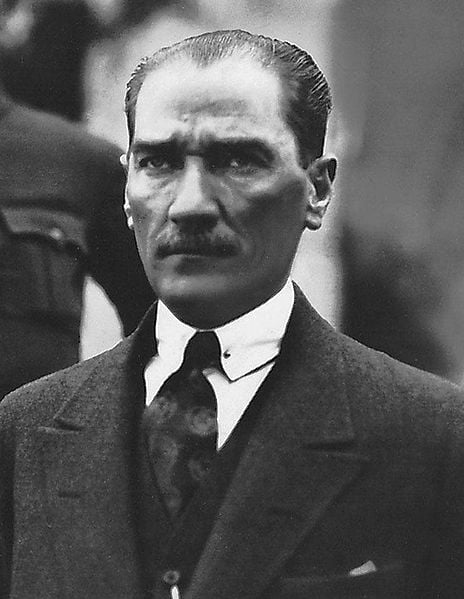Mustafa Kemal Ataturk is the one man who you are going to see everywhere you go in Turkey. Displayed on the Turkish money, on flags and in shops, and offices, you will also see a statue of him in every town. It jogged my memory to tell you, as I was out the other day and there was a huge flag of him displayed next to the Turkish flag. You may spend all your holiday wondering who he is, as the Turkish people do not really talk about him that much but he was the founder of Turkey.
Facts About Mustafa Kemal Ataturk
- He formed the Republic of Turkey in 1923. Previously the land within it’s current borders was part of the Ottoman Empire.
- His title is ‘The father of all Turks’
- He abolished the Islamic justice system and adopted western justice and law methods.
- He introduced the language, known as Turkish by adopting the Latin alaphabet and helped a whole country to learn it within five years.
- He made it law that women could wear their own choice of clothing. Previously the headscarf was compulsory.
- Thanks to Mustafa Kemal Ataturk, Turkey is now the only predominately Muslim country in the world with a democracy.
- He moved the capital from Istanbul to Ankara where it was less vulnerable to attack.
- 10th of November of every year is Mustafa Kemal Ataturk day. Flags of him will be in streets, out of the windows and houses. Turkish Schools will also have a minute’s silence.
As you can see from the facts above, he is a major part of Turkish history and modern-day life however, you do not actually hear many people talking about him unless you bring up the conversation. If you do, expect Turks to speak very highly of him. I too respect him as he has made Turkey a lovely and beautiful country that welcomes strangers and friends from all across the world.
Quote by Mustafa Kemal Ataturk
The most famous quote by Mustaf Kemal Ataturk relates to the awful battle of Gallipoli when many Turkish and Australians soldiers lost their lives
Heroes who shed their blood and lost their lives!
You are now lying in the soil of a friendly country.
Therefore, rest in peace.
There is no difference between the Johnnies and Mehmets to us where they lie side by side here in this country of ours.
You, the mothers, who sent their sons from far away countries, wipe away your tears; your sons are now lying in our bosom and are in peace.
After having lost their lives on this land, they have become our sons as well.
You might also like to read…
About Turkey : The resorts, population, religion and traditions
Culture and Traditions of Turkey : My experiences and lessons learned as I travel around Turkey

